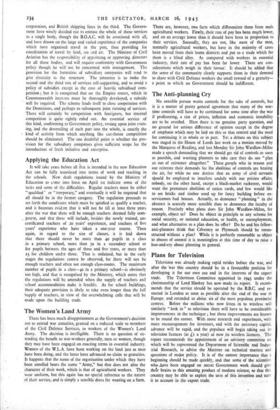The Anti-planning Cry
No sensible person wants controls for the sake of controls, but it is a matter of pretty general agreement that many of the war- time controls will have to be continued for some time after the war if profiteering, a riot of prices, inflation and economic instability are to be avoided. Here there is 'no genuine party question, and no ground for serious difference of opinion except in the degree of emphasis which may be laid on this or that control and the need for continuing it in whole or in part. Yet a debate on this subject was staged in the House of Lords last week on a motion moved by the Marquess of Reading, and last Monday Sir John Wardlaw-Milne made a speech demanding that we should get rid of controls as soon as possible, and warning planners to take care they do not "plan us out of existence altogether.". These .people who in season and out reiterate their demands for the abolition of controls are beating the air, for while no one desires that an army of civil servants sljould be employed to interfere unduly with our private affairs, nobody, on the other hand, except a black-market racketeer, would want the premature abolition of ration cards, and few would like to see bricks and timber used up for fancy building before ex- servicemen had houses. Actually, to denounce " planning " in. .the abstract is scarcely more sensible than to denounce the faculty of reason. Precisely what plans does Sir John Wardlaw-Milne, for example, object to? Does he object in principle to any scheme for social security, or national education, or health, or unemployment, and what alternative to a plan does he offer? Do-he and his fellow- anti-planners think that Cdventry or Plymouth Should be recon- structed without a plan? While it is perfectly reasonable" to object to abuses of control it is meaningless at this time of day to raise a hue-and-cry about planning in general.


























 Previous page
Previous page